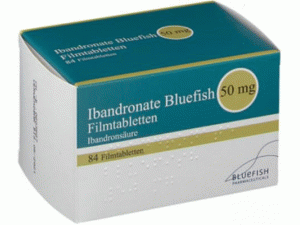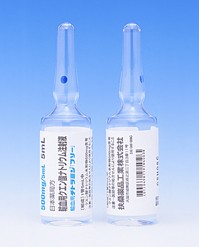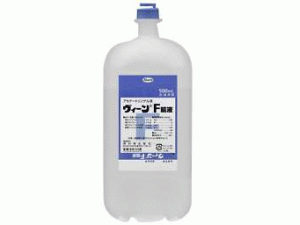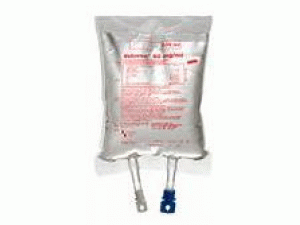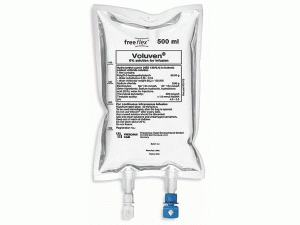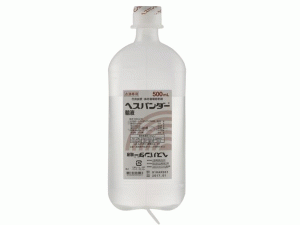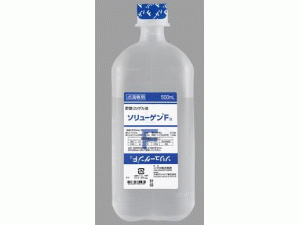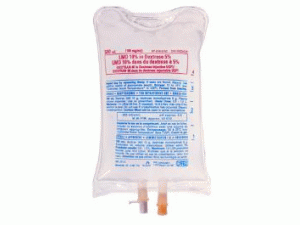贝前列素_Berasus_贝前列素片说明书
[caption id="attachment_42579" align="alignleft" width="300"]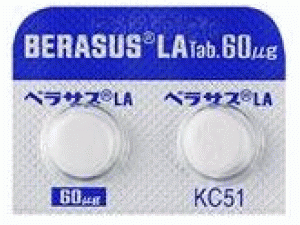 Berasus LA Tablets 60mcg(贝前列素片,ベラサスLA錠)[/caption]
药店国别:
产地国家:日本
处 方 药:是
所属类别:60微克/片 100片/盒
包装规格:60微克/片 100片/盒
计价单位:盒
生产厂家中文参考译名:科研制药
生产厂家英文名:Kaken Pharmacetical Co
原产地英文商品名:Berasus 60mcg/Tablets 100Tablets/box
原产地英文药品名:Beraprost sodium
中文参考商品译名:Berasus 60微克/片 100片/盒
中文参考药品译名:贝前列素钠 LA
简介:
部份中文贝前列素处方资料(仅供参考)
贝前列素是首个具有口服活性的前列环素类似物。空腹吸收迅速,30分钟后达峰浓度,清除半衰期为35~40分钟。
治疗类别名称:口服前列环素(PGI2)衍生物缓释制剂
商標名:BERASUS LA Tablets 60μg
一般名: beraprost (INN)
化学名:
Monosodium (1RS , 2RS , 3aSR , 8bSR )-2, 3, 3a, 8b-tetrahydro-2-hydroxy-1-[(1E , 3SR , 4RS )-3-hydroxy-4-methyloct-1-en-6-yn-1-yl]-1H -cyclopenta[b]benzofuran-5-butanoate
分子式:C24H29NaO5
分子量:420.47
性状:
贝拉普罗斯特钠是一种白色粉末。
非常易溶于甲醇,不溶于水或乙醇(99.5)。
它是吸湿性的。
水溶液(1→200)示出了没有旋光性。
分配系数(1-辛醇/水系统):
460(PH 3),15(pH值为7),0.41(PH9的)
操作注意事项:
为了避免光和水分,避光,它被存储在一个密闭容器中。
药效药理:
1. 血小板凝集抑制作用
(1) 在口服给药至健康成人,其抑制血小板聚集。
(2) 聚集诱导物质通过,有一个人的血小板凝块分解动作(体外)来抑制人的血小板聚集。
2. 血管扩张和血流增加作用
K+通过PGF2α,肠系膜动脉,等等,各种萃取动脉和血清素收缩,到由苯肾上腺素收缩狗的分离的肺动脉狗的股动脉,示出一个放松的效果(体外),狗各种器官容器的增加血流量。
3. 血管平滑肌细胞增殖的抑制作用
抑制人肺动脉血管平滑肌细胞的血小板衍生的生长因子刺激的生长(体外)。
4. 对疾病模型的作用
(1) 肺动脉高压模型
在野百合碱诱导的大鼠肺动脉高压模型,右心室收缩压的升高,抑制肺血管的肌肉肥大在电影中的口服给药。
在血栓素激动剂诱导犬肺动脉高压模型,降低肺动脉压和肺血管阻力在静脉给药。
在栓塞引起的大鼠肺动脉高压模型,打压右心室收缩压上升。
(2) 血栓模型
给大鼠动脉血栓形成和大鼠静脉血栓等,认识到血栓形成的抑制效果。
5. 作用机序
以及前列环素,通过血小板及血管平滑肌的前列腺环素受体贝拉普罗斯特酸钠,激活腺苷酸环化酶,细胞内cAMP浓度上升,由Ca 2+内流抑制和血栓烷A2的产生抑制和类似物,血管扩展动作,显示了抗血小板作用和血管平滑肌细胞增殖的抑制效果。
适应证:肺动脉性肺高血压症
用法用量:
成人,分成2次,每天120μg(早晚餐后口服给药),而症状(副作用)充分观察到逐渐增加。此外,剂量是患者的状况,将适当增加或取决于耐受性下降,和1天360μg,在两次在上午和傍晚口服饭后服用。
包装:(PTP) 100錠 (10錠×10)
制造厂商:科研制药有限公司
Berasus LA Tablets
Brand name : Berasus LA Tablets 60mcg
Active ingredient: Beraprost sodium
Dosage form: white to yellowish white tablet, diameter: 7.0mm, thickness: 2.9mm
Print on wrapping: BERASUS LA Tab. 60μg, ベラサスLA錠60μg, KC51, 60μg
Effects of this medicine
This medicine prevents blood clotting and dilates blood vessels by exerting an action on the prostacyclin receptors on pulmonary vessel smooth muscles and platelets, thus improving the blood flow.
It is usually used in the treatment of pulmonary arterial hypertension.
Before using this medicine, be sure to tell your doctor and pharmacist
•If you have previously experienced any allergic reactions (itch, rash, etc.) to any medicines.
If you have bleeding due to haemophilia, gastrointestinal bleeding, urinary tract haemorrhage, haemoptysis and ocular fundus haemorrhage.
•If you are pregnant, breastfeeding or possibly pregnant.
•If you are taking any other medicinal products. (Some medicines may interact to enhance or diminish medicinal effects. Beware of over-the-counter medicines and dietary supplements as well as other prescription medicines.)
Dosing schedule (How to take this medicine)
•Your dosing schedule prescribed by your doctor is <>
•In general, for adults, take 1 tablet (60 mcg of the active ingredient) at a time, twice a day, after breakfast and supper. The dose may be increased slowly while observing your symptoms. The dose may be adjusted according to your symptoms and tolerability (reaction to the medicine), but the maximum dose is three tablets (180 mcg) at a time, twice a day. Strictly follow the instructions.
•This medicine is a sustained-release preparation. Do not split, crush or grind the tablets. Take it without crunching.
•If you miss a dose, take the missed dose as soon as possible. However, take an interval of about 12 hours before the next dose, and take it after a meal. If it is almost time for the next dose, skip the missed dose and continue your regular dosing schedule. You should never take two doses at one time.
•If you accidentally take more than your prescribed dose, consult with your doctor or pharmacist.
•Do not stop taking this medicine unless your doctor instructs you to do so.
Precautions while taking this medicine
•Since this medicine may cause disturbance of consciousness etc., pay close attention when you operate dangerous machinery such as driving a car.
Possible adverse reactions to this medicine
The most commonly reported adverse reactions include bleeding tendency, subcutaneous haemorrhage, nasal bleeding, anaemia, itching, rash, eczema, erythema, headache, flushed face, hot flush, nausea, malaise, queasy, diarrhoea, palpitations and abdominal pain. If any of these symptoms occur, consult with your doctor or pharmacist.
The symptoms described below are rarely seen as initial symptoms of the adverse reactions indicated in brackets. If any of these symptoms occur, stop taking this medicine and see your doctor immediately.
•headache, hematochezia, visual impairment [bleeding tendency (cerebral haemorrhage, digestive tract haemorrhage, pulmonary haemorrhage, ocular fundus bleeding)]
•facial pallor, dizziness on standing up, feeling of faintness [shock, syncope, loss of consciousness]
•fever, dry cough, difficulty in breathing [interstitial pneumonia]
•general malaise, loss of appetite, yellowing of the skin and the whites of the eyes [hepatic function disorder]
•chest pain, feeling of chest pressure and constriction, cold sweat [angina, myocardial infarction]
The above symptoms do not describe all the adverse reactions to this medicine. Consult with your doctor or pharmacist if you notice any symptoms of concern other than those listed above.
Storage conditions and other information
•Keep out of the reach of children. Store away from light, heat and moisture.
•Discard the remainder. Do not store them. Consult with your dispensing pharmacy or medical institution when you discard the medicine.
Kaken Pharmacetical Co.,LtdInternal
Revised: 11/2013
The information on this sheet is based on approvals granted by the Japanese regulatory authority. Approval details may vary by country. Medicines have adverse reactions (risks) as well as efficacies (benefits). It is important to minimize adverse reactions and maximize efficacy. To obtain a better therapeutic response, patients should understand their medication and cooperate with the treatment.
https://www.info.pmda.go.jp/go/pack/2190027G1030_1_09/
About PAH
PAH is that peripheral arteriole lumen of pulmonary artery where blood pumped from heart to lung gets narrow, and it makes difficult for blood to flow. This causes pulmonary artery high pressure. PAH is classified in two types, one is primary pulmonary hypertension (PPH), and the other is secondary pulmonary hypertension following specific diseases. Exertional dyspnea, fatigability and palpitation are commonly observed initial symptoms, and once it advances, heart failure may result.
Berasus LA Tablets 60mcg(贝前列素片,ベラサスLA錠)[/caption]
药店国别:
产地国家:日本
处 方 药:是
所属类别:60微克/片 100片/盒
包装规格:60微克/片 100片/盒
计价单位:盒
生产厂家中文参考译名:科研制药
生产厂家英文名:Kaken Pharmacetical Co
原产地英文商品名:Berasus 60mcg/Tablets 100Tablets/box
原产地英文药品名:Beraprost sodium
中文参考商品译名:Berasus 60微克/片 100片/盒
中文参考药品译名:贝前列素钠 LA
简介:
部份中文贝前列素处方资料(仅供参考)
贝前列素是首个具有口服活性的前列环素类似物。空腹吸收迅速,30分钟后达峰浓度,清除半衰期为35~40分钟。
治疗类别名称:口服前列环素(PGI2)衍生物缓释制剂
商標名:BERASUS LA Tablets 60μg
一般名: beraprost (INN)
化学名:
Monosodium (1RS , 2RS , 3aSR , 8bSR )-2, 3, 3a, 8b-tetrahydro-2-hydroxy-1-[(1E , 3SR , 4RS )-3-hydroxy-4-methyloct-1-en-6-yn-1-yl]-1H -cyclopenta[b]benzofuran-5-butanoate
分子式:C24H29NaO5
分子量:420.47
性状:
贝拉普罗斯特钠是一种白色粉末。
非常易溶于甲醇,不溶于水或乙醇(99.5)。
它是吸湿性的。
水溶液(1→200)示出了没有旋光性。
分配系数(1-辛醇/水系统):
460(PH 3),15(pH值为7),0.41(PH9的)
操作注意事项:
为了避免光和水分,避光,它被存储在一个密闭容器中。
药效药理:
1. 血小板凝集抑制作用
(1) 在口服给药至健康成人,其抑制血小板聚集。
(2) 聚集诱导物质通过,有一个人的血小板凝块分解动作(体外)来抑制人的血小板聚集。
2. 血管扩张和血流增加作用
K+通过PGF2α,肠系膜动脉,等等,各种萃取动脉和血清素收缩,到由苯肾上腺素收缩狗的分离的肺动脉狗的股动脉,示出一个放松的效果(体外),狗各种器官容器的增加血流量。
3. 血管平滑肌细胞增殖的抑制作用
抑制人肺动脉血管平滑肌细胞的血小板衍生的生长因子刺激的生长(体外)。
4. 对疾病模型的作用
(1) 肺动脉高压模型
在野百合碱诱导的大鼠肺动脉高压模型,右心室收缩压的升高,抑制肺血管的肌肉肥大在电影中的口服给药。
在血栓素激动剂诱导犬肺动脉高压模型,降低肺动脉压和肺血管阻力在静脉给药。
在栓塞引起的大鼠肺动脉高压模型,打压右心室收缩压上升。
(2) 血栓模型
给大鼠动脉血栓形成和大鼠静脉血栓等,认识到血栓形成的抑制效果。
5. 作用机序
以及前列环素,通过血小板及血管平滑肌的前列腺环素受体贝拉普罗斯特酸钠,激活腺苷酸环化酶,细胞内cAMP浓度上升,由Ca 2+内流抑制和血栓烷A2的产生抑制和类似物,血管扩展动作,显示了抗血小板作用和血管平滑肌细胞增殖的抑制效果。
适应证:肺动脉性肺高血压症
用法用量:
成人,分成2次,每天120μg(早晚餐后口服给药),而症状(副作用)充分观察到逐渐增加。此外,剂量是患者的状况,将适当增加或取决于耐受性下降,和1天360μg,在两次在上午和傍晚口服饭后服用。
包装:(PTP) 100錠 (10錠×10)
制造厂商:科研制药有限公司
Berasus LA Tablets
Brand name : Berasus LA Tablets 60mcg
Active ingredient: Beraprost sodium
Dosage form: white to yellowish white tablet, diameter: 7.0mm, thickness: 2.9mm
Print on wrapping: BERASUS LA Tab. 60μg, ベラサスLA錠60μg, KC51, 60μg
Effects of this medicine
This medicine prevents blood clotting and dilates blood vessels by exerting an action on the prostacyclin receptors on pulmonary vessel smooth muscles and platelets, thus improving the blood flow.
It is usually used in the treatment of pulmonary arterial hypertension.
Before using this medicine, be sure to tell your doctor and pharmacist
•If you have previously experienced any allergic reactions (itch, rash, etc.) to any medicines.
If you have bleeding due to haemophilia, gastrointestinal bleeding, urinary tract haemorrhage, haemoptysis and ocular fundus haemorrhage.
•If you are pregnant, breastfeeding or possibly pregnant.
•If you are taking any other medicinal products. (Some medicines may interact to enhance or diminish medicinal effects. Beware of over-the-counter medicines and dietary supplements as well as other prescription medicines.)
Dosing schedule (How to take this medicine)
•Your dosing schedule prescribed by your doctor is <>
•In general, for adults, take 1 tablet (60 mcg of the active ingredient) at a time, twice a day, after breakfast and supper. The dose may be increased slowly while observing your symptoms. The dose may be adjusted according to your symptoms and tolerability (reaction to the medicine), but the maximum dose is three tablets (180 mcg) at a time, twice a day. Strictly follow the instructions.
•This medicine is a sustained-release preparation. Do not split, crush or grind the tablets. Take it without crunching.
•If you miss a dose, take the missed dose as soon as possible. However, take an interval of about 12 hours before the next dose, and take it after a meal. If it is almost time for the next dose, skip the missed dose and continue your regular dosing schedule. You should never take two doses at one time.
•If you accidentally take more than your prescribed dose, consult with your doctor or pharmacist.
•Do not stop taking this medicine unless your doctor instructs you to do so.
Precautions while taking this medicine
•Since this medicine may cause disturbance of consciousness etc., pay close attention when you operate dangerous machinery such as driving a car.
Possible adverse reactions to this medicine
The most commonly reported adverse reactions include bleeding tendency, subcutaneous haemorrhage, nasal bleeding, anaemia, itching, rash, eczema, erythema, headache, flushed face, hot flush, nausea, malaise, queasy, diarrhoea, palpitations and abdominal pain. If any of these symptoms occur, consult with your doctor or pharmacist.
The symptoms described below are rarely seen as initial symptoms of the adverse reactions indicated in brackets. If any of these symptoms occur, stop taking this medicine and see your doctor immediately.
•headache, hematochezia, visual impairment [bleeding tendency (cerebral haemorrhage, digestive tract haemorrhage, pulmonary haemorrhage, ocular fundus bleeding)]
•facial pallor, dizziness on standing up, feeling of faintness [shock, syncope, loss of consciousness]
•fever, dry cough, difficulty in breathing [interstitial pneumonia]
•general malaise, loss of appetite, yellowing of the skin and the whites of the eyes [hepatic function disorder]
•chest pain, feeling of chest pressure and constriction, cold sweat [angina, myocardial infarction]
The above symptoms do not describe all the adverse reactions to this medicine. Consult with your doctor or pharmacist if you notice any symptoms of concern other than those listed above.
Storage conditions and other information
•Keep out of the reach of children. Store away from light, heat and moisture.
•Discard the remainder. Do not store them. Consult with your dispensing pharmacy or medical institution when you discard the medicine.
Kaken Pharmacetical Co.,LtdInternal
Revised: 11/2013
The information on this sheet is based on approvals granted by the Japanese regulatory authority. Approval details may vary by country. Medicines have adverse reactions (risks) as well as efficacies (benefits). It is important to minimize adverse reactions and maximize efficacy. To obtain a better therapeutic response, patients should understand their medication and cooperate with the treatment.
https://www.info.pmda.go.jp/go/pack/2190027G1030_1_09/
About PAH
PAH is that peripheral arteriole lumen of pulmonary artery where blood pumped from heart to lung gets narrow, and it makes difficult for blood to flow. This causes pulmonary artery high pressure. PAH is classified in two types, one is primary pulmonary hypertension (PPH), and the other is secondary pulmonary hypertension following specific diseases. Exertional dyspnea, fatigability and palpitation are commonly observed initial symptoms, and once it advances, heart failure may result.
 Berasus LA Tablets 60mcg(贝前列素片,ベラサスLA錠)[/caption]
药店国别:
产地国家:日本
处 方 药:是
所属类别:60微克/片 100片/盒
包装规格:60微克/片 100片/盒
计价单位:盒
生产厂家中文参考译名:科研制药
生产厂家英文名:Kaken Pharmacetical Co
原产地英文商品名:Berasus 60mcg/Tablets 100Tablets/box
原产地英文药品名:Beraprost sodium
中文参考商品译名:Berasus 60微克/片 100片/盒
中文参考药品译名:贝前列素钠 LA
简介:
部份中文贝前列素处方资料(仅供参考)
贝前列素是首个具有口服活性的前列环素类似物。空腹吸收迅速,30分钟后达峰浓度,清除半衰期为35~40分钟。
治疗类别名称:口服前列环素(PGI2)衍生物缓释制剂
商標名:BERASUS LA Tablets 60μg
一般名: beraprost (INN)
化学名:
Monosodium (1RS , 2RS , 3aSR , 8bSR )-2, 3, 3a, 8b-tetrahydro-2-hydroxy-1-[(1E , 3SR , 4RS )-3-hydroxy-4-methyloct-1-en-6-yn-1-yl]-1H -cyclopenta[b]benzofuran-5-butanoate
分子式:C24H29NaO5
分子量:420.47
性状:
贝拉普罗斯特钠是一种白色粉末。
非常易溶于甲醇,不溶于水或乙醇(99.5)。
它是吸湿性的。
水溶液(1→200)示出了没有旋光性。
分配系数(1-辛醇/水系统):
460(PH 3),15(pH值为7),0.41(PH9的)
操作注意事项:
为了避免光和水分,避光,它被存储在一个密闭容器中。
药效药理:
1. 血小板凝集抑制作用
(1) 在口服给药至健康成人,其抑制血小板聚集。
(2) 聚集诱导物质通过,有一个人的血小板凝块分解动作(体外)来抑制人的血小板聚集。
2. 血管扩张和血流增加作用
K+通过PGF2α,肠系膜动脉,等等,各种萃取动脉和血清素收缩,到由苯肾上腺素收缩狗的分离的肺动脉狗的股动脉,示出一个放松的效果(体外),狗各种器官容器的增加血流量。
3. 血管平滑肌细胞增殖的抑制作用
抑制人肺动脉血管平滑肌细胞的血小板衍生的生长因子刺激的生长(体外)。
4. 对疾病模型的作用
(1) 肺动脉高压模型
在野百合碱诱导的大鼠肺动脉高压模型,右心室收缩压的升高,抑制肺血管的肌肉肥大在电影中的口服给药。
在血栓素激动剂诱导犬肺动脉高压模型,降低肺动脉压和肺血管阻力在静脉给药。
在栓塞引起的大鼠肺动脉高压模型,打压右心室收缩压上升。
(2) 血栓模型
给大鼠动脉血栓形成和大鼠静脉血栓等,认识到血栓形成的抑制效果。
5. 作用机序
以及前列环素,通过血小板及血管平滑肌的前列腺环素受体贝拉普罗斯特酸钠,激活腺苷酸环化酶,细胞内cAMP浓度上升,由Ca 2+内流抑制和血栓烷A2的产生抑制和类似物,血管扩展动作,显示了抗血小板作用和血管平滑肌细胞增殖的抑制效果。
适应证:肺动脉性肺高血压症
用法用量:
成人,分成2次,每天120μg(早晚餐后口服给药),而症状(副作用)充分观察到逐渐增加。此外,剂量是患者的状况,将适当增加或取决于耐受性下降,和1天360μg,在两次在上午和傍晚口服饭后服用。
包装:(PTP) 100錠 (10錠×10)
制造厂商:科研制药有限公司
Berasus LA Tablets
Brand name : Berasus LA Tablets 60mcg
Active ingredient: Beraprost sodium
Dosage form: white to yellowish white tablet, diameter: 7.0mm, thickness: 2.9mm
Print on wrapping: BERASUS LA Tab. 60μg, ベラサスLA錠60μg, KC51, 60μg
Effects of this medicine
This medicine prevents blood clotting and dilates blood vessels by exerting an action on the prostacyclin receptors on pulmonary vessel smooth muscles and platelets, thus improving the blood flow.
It is usually used in the treatment of pulmonary arterial hypertension.
Before using this medicine, be sure to tell your doctor and pharmacist
•If you have previously experienced any allergic reactions (itch, rash, etc.) to any medicines.
If you have bleeding due to haemophilia, gastrointestinal bleeding, urinary tract haemorrhage, haemoptysis and ocular fundus haemorrhage.
•If you are pregnant, breastfeeding or possibly pregnant.
•If you are taking any other medicinal products. (Some medicines may interact to enhance or diminish medicinal effects. Beware of over-the-counter medicines and dietary supplements as well as other prescription medicines.)
Dosing schedule (How to take this medicine)
•Your dosing schedule prescribed by your doctor is <>
•In general, for adults, take 1 tablet (60 mcg of the active ingredient) at a time, twice a day, after breakfast and supper. The dose may be increased slowly while observing your symptoms. The dose may be adjusted according to your symptoms and tolerability (reaction to the medicine), but the maximum dose is three tablets (180 mcg) at a time, twice a day. Strictly follow the instructions.
•This medicine is a sustained-release preparation. Do not split, crush or grind the tablets. Take it without crunching.
•If you miss a dose, take the missed dose as soon as possible. However, take an interval of about 12 hours before the next dose, and take it after a meal. If it is almost time for the next dose, skip the missed dose and continue your regular dosing schedule. You should never take two doses at one time.
•If you accidentally take more than your prescribed dose, consult with your doctor or pharmacist.
•Do not stop taking this medicine unless your doctor instructs you to do so.
Precautions while taking this medicine
•Since this medicine may cause disturbance of consciousness etc., pay close attention when you operate dangerous machinery such as driving a car.
Possible adverse reactions to this medicine
The most commonly reported adverse reactions include bleeding tendency, subcutaneous haemorrhage, nasal bleeding, anaemia, itching, rash, eczema, erythema, headache, flushed face, hot flush, nausea, malaise, queasy, diarrhoea, palpitations and abdominal pain. If any of these symptoms occur, consult with your doctor or pharmacist.
The symptoms described below are rarely seen as initial symptoms of the adverse reactions indicated in brackets. If any of these symptoms occur, stop taking this medicine and see your doctor immediately.
•headache, hematochezia, visual impairment [bleeding tendency (cerebral haemorrhage, digestive tract haemorrhage, pulmonary haemorrhage, ocular fundus bleeding)]
•facial pallor, dizziness on standing up, feeling of faintness [shock, syncope, loss of consciousness]
•fever, dry cough, difficulty in breathing [interstitial pneumonia]
•general malaise, loss of appetite, yellowing of the skin and the whites of the eyes [hepatic function disorder]
•chest pain, feeling of chest pressure and constriction, cold sweat [angina, myocardial infarction]
The above symptoms do not describe all the adverse reactions to this medicine. Consult with your doctor or pharmacist if you notice any symptoms of concern other than those listed above.
Storage conditions and other information
•Keep out of the reach of children. Store away from light, heat and moisture.
•Discard the remainder. Do not store them. Consult with your dispensing pharmacy or medical institution when you discard the medicine.
Kaken Pharmacetical Co.,LtdInternal
Revised: 11/2013
The information on this sheet is based on approvals granted by the Japanese regulatory authority. Approval details may vary by country. Medicines have adverse reactions (risks) as well as efficacies (benefits). It is important to minimize adverse reactions and maximize efficacy. To obtain a better therapeutic response, patients should understand their medication and cooperate with the treatment.
https://www.info.pmda.go.jp/go/pack/2190027G1030_1_09/
About PAH
PAH is that peripheral arteriole lumen of pulmonary artery where blood pumped from heart to lung gets narrow, and it makes difficult for blood to flow. This causes pulmonary artery high pressure. PAH is classified in two types, one is primary pulmonary hypertension (PPH), and the other is secondary pulmonary hypertension following specific diseases. Exertional dyspnea, fatigability and palpitation are commonly observed initial symptoms, and once it advances, heart failure may result.
Berasus LA Tablets 60mcg(贝前列素片,ベラサスLA錠)[/caption]
药店国别:
产地国家:日本
处 方 药:是
所属类别:60微克/片 100片/盒
包装规格:60微克/片 100片/盒
计价单位:盒
生产厂家中文参考译名:科研制药
生产厂家英文名:Kaken Pharmacetical Co
原产地英文商品名:Berasus 60mcg/Tablets 100Tablets/box
原产地英文药品名:Beraprost sodium
中文参考商品译名:Berasus 60微克/片 100片/盒
中文参考药品译名:贝前列素钠 LA
简介:
部份中文贝前列素处方资料(仅供参考)
贝前列素是首个具有口服活性的前列环素类似物。空腹吸收迅速,30分钟后达峰浓度,清除半衰期为35~40分钟。
治疗类别名称:口服前列环素(PGI2)衍生物缓释制剂
商標名:BERASUS LA Tablets 60μg
一般名: beraprost (INN)
化学名:
Monosodium (1RS , 2RS , 3aSR , 8bSR )-2, 3, 3a, 8b-tetrahydro-2-hydroxy-1-[(1E , 3SR , 4RS )-3-hydroxy-4-methyloct-1-en-6-yn-1-yl]-1H -cyclopenta[b]benzofuran-5-butanoate
分子式:C24H29NaO5
分子量:420.47
性状:
贝拉普罗斯特钠是一种白色粉末。
非常易溶于甲醇,不溶于水或乙醇(99.5)。
它是吸湿性的。
水溶液(1→200)示出了没有旋光性。
分配系数(1-辛醇/水系统):
460(PH 3),15(pH值为7),0.41(PH9的)
操作注意事项:
为了避免光和水分,避光,它被存储在一个密闭容器中。
药效药理:
1. 血小板凝集抑制作用
(1) 在口服给药至健康成人,其抑制血小板聚集。
(2) 聚集诱导物质通过,有一个人的血小板凝块分解动作(体外)来抑制人的血小板聚集。
2. 血管扩张和血流增加作用
K+通过PGF2α,肠系膜动脉,等等,各种萃取动脉和血清素收缩,到由苯肾上腺素收缩狗的分离的肺动脉狗的股动脉,示出一个放松的效果(体外),狗各种器官容器的增加血流量。
3. 血管平滑肌细胞增殖的抑制作用
抑制人肺动脉血管平滑肌细胞的血小板衍生的生长因子刺激的生长(体外)。
4. 对疾病模型的作用
(1) 肺动脉高压模型
在野百合碱诱导的大鼠肺动脉高压模型,右心室收缩压的升高,抑制肺血管的肌肉肥大在电影中的口服给药。
在血栓素激动剂诱导犬肺动脉高压模型,降低肺动脉压和肺血管阻力在静脉给药。
在栓塞引起的大鼠肺动脉高压模型,打压右心室收缩压上升。
(2) 血栓模型
给大鼠动脉血栓形成和大鼠静脉血栓等,认识到血栓形成的抑制效果。
5. 作用机序
以及前列环素,通过血小板及血管平滑肌的前列腺环素受体贝拉普罗斯特酸钠,激活腺苷酸环化酶,细胞内cAMP浓度上升,由Ca 2+内流抑制和血栓烷A2的产生抑制和类似物,血管扩展动作,显示了抗血小板作用和血管平滑肌细胞增殖的抑制效果。
适应证:肺动脉性肺高血压症
用法用量:
成人,分成2次,每天120μg(早晚餐后口服给药),而症状(副作用)充分观察到逐渐增加。此外,剂量是患者的状况,将适当增加或取决于耐受性下降,和1天360μg,在两次在上午和傍晚口服饭后服用。
包装:(PTP) 100錠 (10錠×10)
制造厂商:科研制药有限公司
Berasus LA Tablets
Brand name : Berasus LA Tablets 60mcg
Active ingredient: Beraprost sodium
Dosage form: white to yellowish white tablet, diameter: 7.0mm, thickness: 2.9mm
Print on wrapping: BERASUS LA Tab. 60μg, ベラサスLA錠60μg, KC51, 60μg
Effects of this medicine
This medicine prevents blood clotting and dilates blood vessels by exerting an action on the prostacyclin receptors on pulmonary vessel smooth muscles and platelets, thus improving the blood flow.
It is usually used in the treatment of pulmonary arterial hypertension.
Before using this medicine, be sure to tell your doctor and pharmacist
•If you have previously experienced any allergic reactions (itch, rash, etc.) to any medicines.
If you have bleeding due to haemophilia, gastrointestinal bleeding, urinary tract haemorrhage, haemoptysis and ocular fundus haemorrhage.
•If you are pregnant, breastfeeding or possibly pregnant.
•If you are taking any other medicinal products. (Some medicines may interact to enhance or diminish medicinal effects. Beware of over-the-counter medicines and dietary supplements as well as other prescription medicines.)
Dosing schedule (How to take this medicine)
•Your dosing schedule prescribed by your doctor is <>
•In general, for adults, take 1 tablet (60 mcg of the active ingredient) at a time, twice a day, after breakfast and supper. The dose may be increased slowly while observing your symptoms. The dose may be adjusted according to your symptoms and tolerability (reaction to the medicine), but the maximum dose is three tablets (180 mcg) at a time, twice a day. Strictly follow the instructions.
•This medicine is a sustained-release preparation. Do not split, crush or grind the tablets. Take it without crunching.
•If you miss a dose, take the missed dose as soon as possible. However, take an interval of about 12 hours before the next dose, and take it after a meal. If it is almost time for the next dose, skip the missed dose and continue your regular dosing schedule. You should never take two doses at one time.
•If you accidentally take more than your prescribed dose, consult with your doctor or pharmacist.
•Do not stop taking this medicine unless your doctor instructs you to do so.
Precautions while taking this medicine
•Since this medicine may cause disturbance of consciousness etc., pay close attention when you operate dangerous machinery such as driving a car.
Possible adverse reactions to this medicine
The most commonly reported adverse reactions include bleeding tendency, subcutaneous haemorrhage, nasal bleeding, anaemia, itching, rash, eczema, erythema, headache, flushed face, hot flush, nausea, malaise, queasy, diarrhoea, palpitations and abdominal pain. If any of these symptoms occur, consult with your doctor or pharmacist.
The symptoms described below are rarely seen as initial symptoms of the adverse reactions indicated in brackets. If any of these symptoms occur, stop taking this medicine and see your doctor immediately.
•headache, hematochezia, visual impairment [bleeding tendency (cerebral haemorrhage, digestive tract haemorrhage, pulmonary haemorrhage, ocular fundus bleeding)]
•facial pallor, dizziness on standing up, feeling of faintness [shock, syncope, loss of consciousness]
•fever, dry cough, difficulty in breathing [interstitial pneumonia]
•general malaise, loss of appetite, yellowing of the skin and the whites of the eyes [hepatic function disorder]
•chest pain, feeling of chest pressure and constriction, cold sweat [angina, myocardial infarction]
The above symptoms do not describe all the adverse reactions to this medicine. Consult with your doctor or pharmacist if you notice any symptoms of concern other than those listed above.
Storage conditions and other information
•Keep out of the reach of children. Store away from light, heat and moisture.
•Discard the remainder. Do not store them. Consult with your dispensing pharmacy or medical institution when you discard the medicine.
Kaken Pharmacetical Co.,LtdInternal
Revised: 11/2013
The information on this sheet is based on approvals granted by the Japanese regulatory authority. Approval details may vary by country. Medicines have adverse reactions (risks) as well as efficacies (benefits). It is important to minimize adverse reactions and maximize efficacy. To obtain a better therapeutic response, patients should understand their medication and cooperate with the treatment.
https://www.info.pmda.go.jp/go/pack/2190027G1030_1_09/
About PAH
PAH is that peripheral arteriole lumen of pulmonary artery where blood pumped from heart to lung gets narrow, and it makes difficult for blood to flow. This causes pulmonary artery high pressure. PAH is classified in two types, one is primary pulmonary hypertension (PPH), and the other is secondary pulmonary hypertension following specific diseases. Exertional dyspnea, fatigability and palpitation are commonly observed initial symptoms, and once it advances, heart failure may result.
用药温馨提示:当您服用此药物时,需定期接受医疗专业人士的检查,以便随时针对其药效、副作用等情况进行监测。本网站所包含的信息旨在为患者提供帮助,不能代替医学建议和治疗。
药品价格查询,专业药品查询网站,药品说明书查询,药品比价 » 贝前列素_Berasus_贝前列素片说明书
药品价格查询,专业药品查询网站,药品说明书查询,药品比价 » 贝前列素_Berasus_贝前列素片说明书

